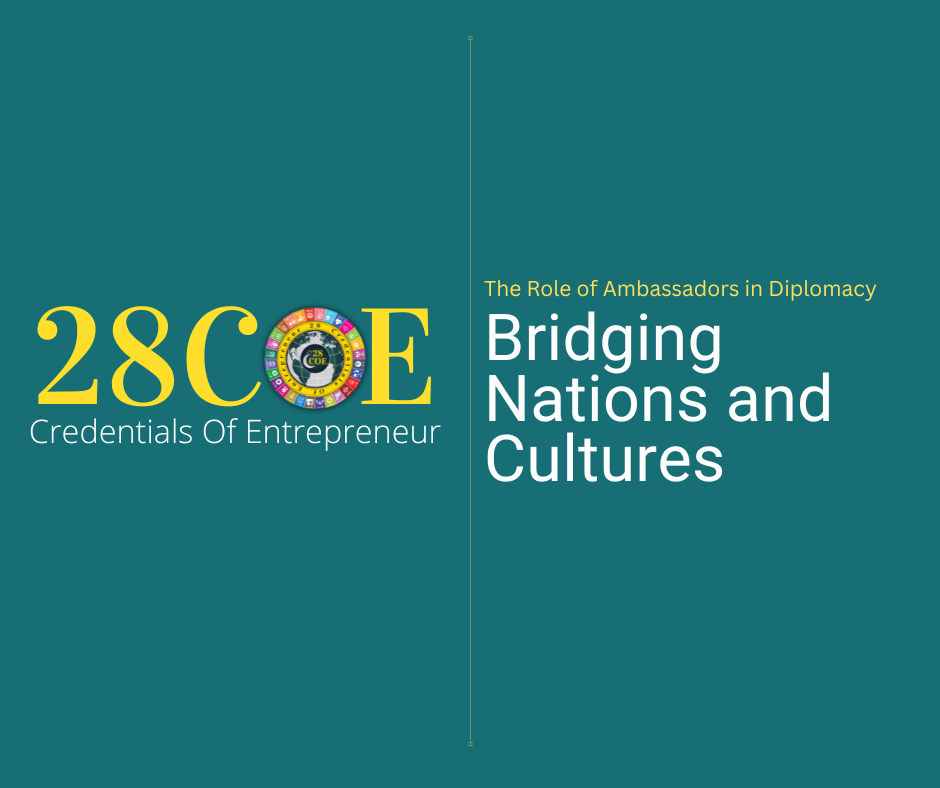Diplomacy, often dubbed the “art of negotiation,” plays a pivotal role in international relations. At the heart of this intricate dance between nations are ambassadors, skilled diplomats who serve as the face of their countries on foreign soil. Ambassadors are more than just diplomats; they are the architects of peace, the conduits of communication, and the advocates for their nations’ interests. In this blog, we delve into the multifaceted role of ambassadors in diplomacy and their profound impact on shaping the world stage.
Defining the Ambassadorial Role
Ambassadors are the highest-ranking diplomats sent by one country to represent its interests in another. They are appointed by the head of state, typically the president or prime minister, and they serve as a direct link between their home country’s government and the host country’s government.
- Building and Strengthening Relationships
One of the primary functions of an ambassador is to build and strengthen relationships between their home country and the host country. This involves engaging in diplomatic negotiations, fostering trust, and working to resolve conflicts peacefully. Ambassadors are instrumental in preventing misunderstandings that can lead to disputes or even armed conflicts.
- Advocating for National Interests
Ambassadors are tasked with advancing their nation’s interests abroad. This involves promoting trade, investment, and cultural exchanges, among other things. They negotiate treaties and agreements that benefit their country while ensuring the host country also sees advantages in such arrangements.
- Promoting Cultural Exchange
Cultural diplomacy is an essential component of an ambassador’s work. They facilitate cultural exchanges, showcasing their nation’s art, music, literature, and traditions. This helps to bridge cultural gaps and foster a deeper understanding between nations.
- Crisis Management and Conflict Resolution
In times of crisis, ambassadors are critical in ensuring their home country’s interests are protected. They may negotiate the release of hostages, provide critical information during natural disasters, or work to de-escalate conflicts.
- Reporting and Information Gathering
Ambassadors serve as the eyes and ears of their home governments, providing regular reports on political, economic, and social developments in the host country. This information is invaluable for shaping foreign policy decisions.
- Representing Their Nation with Dignity
Ambassadors are not just diplomats; they are symbols of their nation’s dignity and respect. Their conduct, both in official and social settings, reflects the values and culture of their homeland.
The Challenges of Modern Diplomacy
The role of ambassadors in diplomacy has evolved significantly with globalization and the advent of technology. They now navigate complex issues such as cybersecurity, climate change, and global health, in addition to traditional diplomatic matters. Furthermore, the rise of digital diplomacy means that ambassadors are increasingly using social media and online platforms to engage with the public, transcending traditional diplomatic circles.
The Legacy of Ambassadors
Ambassadors leave a lasting legacy in international relations. Their ability to foster understanding, resolve conflicts, and advocate for their nation’s interests shapes the course of history. Some ambassadors become renowned figures who are remembered for their contributions to peace and diplomacy, transcending their time in office.
In conclusion, ambassadors play a vital role in diplomacy, acting as the linchpin between nations, cultures, and interests. They are not merely representatives; they are diplomats, negotiators, cultural ambassadors, and crisis managers. In an interconnected world, the work of ambassadors continues to be instrumental in maintaining peace, fostering cooperation, and advancing the interests of their nations. Their role is a testament to the enduring importance of diplomacy in shaping the world we live in.

